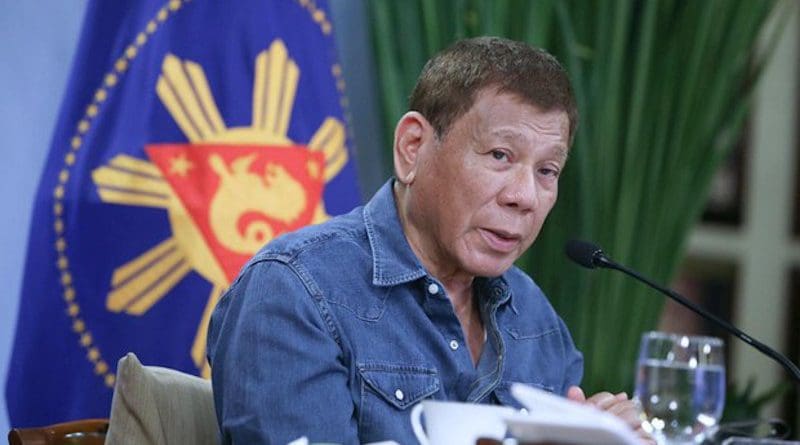Philippines: President Duterte Won’t Cooperate With ICC Probe Into Drug War
By BenarNews
By J.C. Gotinga
Philippine President Rodrigo Duterte refuses to cooperate with a request by the International Criminal Court’s top prosecutor to investigate extrajudicial killings in his administration’s war on drugs, and has dismissed it as politically driven, his spokesman said Tuesday.
Any ICC investigation would depend on cooperation from the government, but the court in The Hague no longer has the right to pursue such a case because the Philippines has pulled out of an international treaty that created the court, presidential spokesman Harry Roque said.
“The president will never, ever cooperate,” Roque said, adding that outgoing ICC Chief Prosecutor Fatou Bensouda’s request on Monday to press ahead with a formal investigation was “legally erroneous” and “politically motivated.”
“This is now a political issue,” Roque said, adding that allegations of mass murder were brought to the ICC by the president’s political opponents, whom he claimed would be seeking higher public office in general elections next year.
The case originated from information filed by Antonio Trillanes IV, a former senator and a staunch critic of Duterte. Without naming Trillanes, Roque noted that the source of the complaint planned to run for president or vice president in elections set for May 2022.
Trillanes welcomed the announcement by the ICC prosecutor.
“This is another monumental step toward justice for all the families of victims of EJKs. The long arm of the law will soon catch up with Duterte and his accomplices,” Trillanes said, referring to extrajudicial killings.
Duterte, meanwhile, remained defiant about his war on drugs, while addressing the nation on Monday.
“My guideline is do not destroy my country, I will kill you. Do not destroy the youth of the land,” he said during a broadcast of his weekly address. “You destroy their life, I will destroy you. That’s the way it is – I will kill you to end the problem.”
He also commented on probes against him.
“With the advent of this human rights investigation, I have also been investigated by the Human Rights Commission headed by de Lima. Nothing came of it, no recommendation, no nothing, just aspersions,” Duterte said, referring to opposition Sen. Leila de Lima.
Despite being jailed on a pair of drug charges after her acquittal on a third charge earlier this year, de Lima has emerged as one of President Duterte’s toughest political foes.
She angered Duterte when, as chairwoman of the Commission on Human Rights, she investigated reports of extrajudicial killings by a death squad allegedly set up by Duterte in Davao City, where he served as mayor before being elected president in 2016.
Jurisdiction questioned
Roque, a former human rights lawyer, argued that the ICC had no jurisdiction over the Duterte administration’s war on drugs because, contrary to Bensouda’s allegation, it is not an instance of a crime against humanity.
The ICC’s statutes define a crime against humanity as a willful attack on civilians, which, according to Roque, the drug war is not.
“Where there are deaths as an incident to a lawful operation in connection with the war against drugs … it was coincidental or collateral damage, either because the policeman had the right to defend himself using reasonable force or they were, in fact, the subject of an attack and therefore justified by the principle of necessity and proportionality,” Roque said.
As a court of last resort, the ICC cannot investigate cases in the Philippines because the nation has a functioning legal system, police and judicial institutions, he said. Roque cited the principle of complementarity in which the ICC may not exercise jurisdiction unless a member state is unable or unwilling to prosecute the cases in question.
In fact, the justice department and the national police recently declared that they would investigate all cases of deaths during police operations, Roque said.
The outgoing ICC chief prosecutor from The Gambia, Roque added, has been criticized for filing cases only against her fellow Africans, so she needed to prove otherwise by going after Duterte.
‘Deeply regrettable’
Manila’s Department of Foreign Affairs issued a separate statement on Tuesday, saying it found Bensouda’s request for judicial authorization to proceed with an investigation “deeply regrettable.”
The government has taken “concrete and progressive steps” to address concerns about the anti-drug campaign, including a Joint Program on Human Rights with the United Nations. These affirm the Philippines’ adherence to human rights norms and its track record of constructive engagement with the international community with regard to human rights, the DFA said.
“The Philippine government finds deeply regrettable the announcement of the outgoing prosecutor of the International Criminal Court to seek judicial authorization to proceed with an investigation of the situation in the Philippines,” the DFA said.
It criticized Bensouda’s “midnight announcement” on the eve of the end of her term, saying it “preempts the prerogative of her successor to make a full evaluation of the cases that he will prosecute.”
Bensouda has said she expected her successor, Karim Khan, to carry on with the investigation.
Meanwhile, the spokeswoman for the Philippines Commission on Human Rights (CHR), Jacqueline Ann de Guia, said the ICC did have jurisdiction over cases that occurred before the country pulled out of the treaty.
The Philippines was a party to the ICC accord from Nov. 1, 2011, to March 16, 2019.
Duterte unilaterally withdrew the country’s membership on March 17, 2019, raising questions about his authority to do so because Philippine law requires Senate ratification of international treaties, according to the commission.
“In this regard, CHR, as the country’s independent national human rights institution, continues to advise the present Philippine government to participate in this process of seeking truth and justice for the human rights violations committed in the country,” de Guia said on Tuesday.

